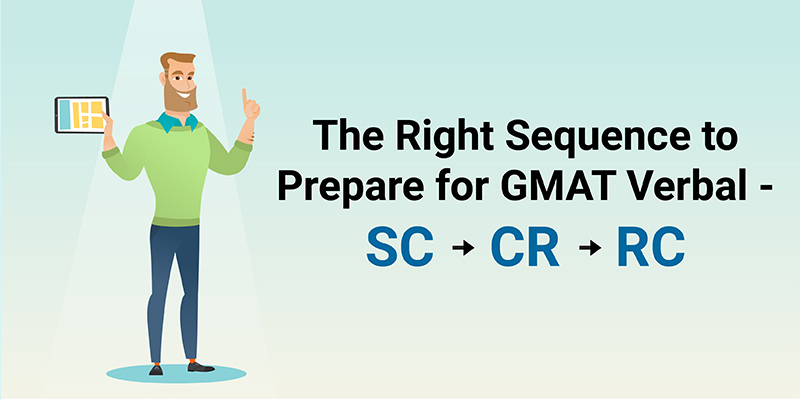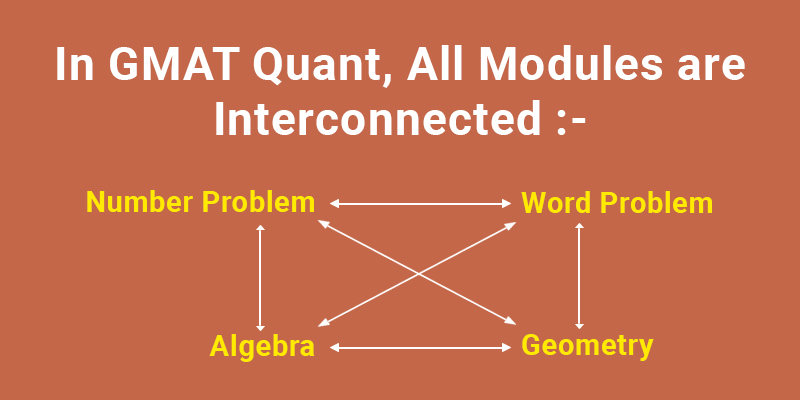On an average, more than 70% of the questions on GMAT do not just test one but multiple concepts. Some of these skills can lay the foundation for the more advanced ones, making it easier to understand the topics of higher difficulty level. Thus, it becomes important to study concepts in the right order, because if you don’t do so then once you complete a module, you’ll end up with a low score without even understanding why you’re weak.

Those who are relatively new to GMAT may not have as much understanding of what the test demands from them. Therefore, beginners usually do not put in enough time and effort to learn things in the right order. So, to help you with that, in this article we will discuss the right order to approach the two important sections of GMAT i.e. Verbal and Quant. Let’s begin with Verbal first:
I. The Right Order to Prepare for GMAT VERBAL
The Verbal section in GMAT consists of three modules –
- Reading Comprehension
- Critical Reasoning
- Sentence Correction
The popular practice among beginners is to take all modules together instead of focussing on one module at a time. While alternating between the three modules may seem like its leading you somewhere, you might not be able to effectively build the required skills to crack GMAT Verbal in the best way possible. Here’s why –
To score well on Verbal, students need to master three important skills –
- Comprehension Skills
- Analytical Skills
- Ability to Focus on main points
Since the three skills are interdependent, it is important for beginners to build them progressively. Now, when we say progressively, we mean you should first take up the skill that is least dependent on the other two, i.e. the Comprehension skill and then move on to the other skills.
- Since, Sentence Correction requires you to master only one skill – the comprehension skill – you can start your prep with SC. In SC, you need to focus only on one sentence and choose the one that communicates the correct and logical meaning.
- Critical Reasoning requires mastering two skills, i.e. comprehension and analytical skills. You must understand the meaning of every sentence and you also need to understand how the given sentences are linked to identify the logical gaps. By learning CR after SC, you will only need to learn the analytical skill while studying CR.
- Reading comprehension requires all the three skills – comprehension, analytical, and the ability to focus. So, even if you find yourself acing the RC naturally, it is best to save it for the last.

Thus, from the above discussion it is clear that the right order for beginners to prepare for Verbal is to start with SC, then work on CR, and finally move to RC. It is also important that you focus on one module at a time, master it, and only then move on to the next. For instance, while working on CR, you should first ace inference, as it helps strengthen your current understanding of the information provided. Once you learn to correctly infer the information, you can move on to the other topics where you not only need to master inference, but you need gap filling as well.
Need a study plan to prepare for GMAT Verbal in the correct order? Take a free trial!
II. The Correct Way to Prepare for GMAT Quant
For GMAT Quant, most resources usually go by a standard rule, i.e. to learn one module at a time. For example, most would recommend beginning with Number Properties, then moving subsequently to Algebra, then to Word Problems, and so on. However, logically speaking every module in Quant is inter-linked. Hence, the approach of learning one at a time isn’t the best approach.
For instance, to understand Number Properties you require an understanding of Equations, which belongs to Algebra. Similarly, some concepts in Algebra require you to be good at Number Properties. So, it becomes difficult to decide which module to begin with and when.

What is the correct way to prepare for GMAT Quant?
The logical approach would be to begin with the Basic topics that form the foundation for the other topics. Once your Quant Foundation skills are strong enough, you should move to the Intermediate topics and thereon to Advanced ones. Remember, unless you’re highly skilled at Foundation topics, moving to the Intermediate ones is going to be a wasteful activity.
Which Quant topics should you cover initially?
To ensure that your Quant basics are strong enough, you must first work on the following topics in the given order –
- Numbers Classification
- Fractions & Decimals
- Estimation and Rounding
- Algebra
a. Linear Equations
b. Quadratic Equations
c. Exponents & Identities - Word Problems Basics
a. Unitary Method and Unit Conversion
b. Ratio & Proportions
c. Percentages - Basics of Number Properties
a. Even-Odd
b. Prime Numbers
c. LCM-GCD
Now that your Quant Foundation is sorted, you must follow the right order for the Intermediate and Advanced Quant as well! If you want to know what the right order for the two is, you can just take a FREE TRIAL here!
For more such tips to effectively prepare for GMAT, follow our blog here. For help from a Quant or Verbal expert, reach us at support@gmatwhiz.com!